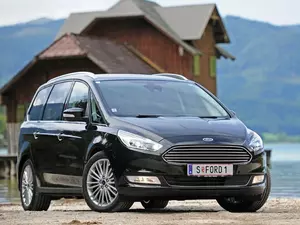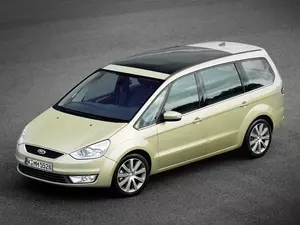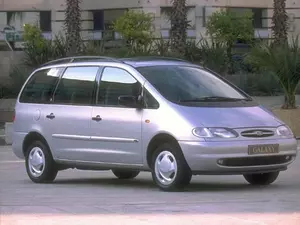
| Vehicle | Curb weight | Difference from world's smallest | Weight to power ratio | 0—60 mph acceleration ratio | Consumption ratio |
|---|---|---|---|---|---|
| 1.5 EcoBoost |
1633 kg / 3601 lbs |
1208 kg (2664 lbs) heavier | 10 kg to 1 hp | 174 kg/s (384 lbs/s) |
218 kg/L (481 lbs/L) |
| 2.0 EcoBoost |
1658 kg / 3656 lbs |
1233 kg (2719 lbs) heavier | 7 kg to 1 hp | 202 kg/s (445 lbs/s) |
210 kg/L (463 lbs/L) |
| 2.0 TDCi |
1704 kg / 3757 lbs |
1279 kg (2820 lbs) heavier | 8 kg to 1 hp | 200 kg/s (441 lbs/s) |
310 kg/L (684 lbs/L) |
| 2.0 EcoBlue Bi-Turbo |
1704 kg / 3757 lbs |
1279 kg (2820 lbs) heavier | 7 kg to 1 hp | 205 kg/s (452 lbs/s) |
279 kg/L (615 lbs/L) |
| 2.0 EcoBlue |
1766 kg / 3894 lbs |
1341 kg (2957 lbs) heavier | 9 kg to 1 hp | 186 kg/s (410 lbs/s) |
290 kg/L (639 lbs/L) |
| Vehicle | 1.5 EcoBoost |
|---|---|
| Curb weight |
1633 kg / 3601 lbs |
| Difference from world's smallest | 1208 kg (1208 lbs) heavier |
| Weight to power ratio | 10 kg to 1 hp |
| 0—60 mph acceleration ratio | 174 kg/s (384 lbs/s) |
| Consumption ratio |
218 kg/L (481 lbs/L) |
| Vehicle | 2.0 EcoBoost |
| Curb weight |
1658 kg / 3656 lbs |
| Difference from world's smallest | 1233 kg (1233 lbs) heavier |
| Weight to power ratio | 7 kg to 1 hp |
| 0—60 mph acceleration ratio | 202 kg/s (445 lbs/s) |
| Consumption ratio |
210 kg/L (463 lbs/L) |
| Vehicle | 2.0 TDCi |
| Curb weight |
1704 kg / 3757 lbs |
| Difference from world's smallest | 1279 kg (1279 lbs) heavier |
| Weight to power ratio | 8 kg to 1 hp |
| 0—60 mph acceleration ratio | 200 kg/s (441 lbs/s) |
| Consumption ratio |
310 kg/L (684 lbs/L) |
| Vehicle | 2.0 EcoBlue Bi-Turbo |
| Curb weight |
1704 kg / 3757 lbs |
| Difference from world's smallest | 1279 kg (1279 lbs) heavier |
| Weight to power ratio | 7 kg to 1 hp |
| 0—60 mph acceleration ratio | 205 kg/s (452 lbs/s) |
| Consumption ratio |
279 kg/L (615 lbs/L) |
| Vehicle | 2.0 EcoBlue |
| Curb weight |
1766 kg / 3894 lbs |
| Difference from world's smallest | 1341 kg (1341 lbs) heavier |
| Weight to power ratio | 9 kg to 1 hp |
| 0—60 mph acceleration ratio | 186 kg/s (410 lbs/s) |
| Consumption ratio |
290 kg/L (639 lbs/L) |

| Vehicle | Curb weight | Difference from world's smallest | Weight to power ratio | 0—60 mph acceleration ratio | Consumption ratio |
|---|---|---|---|---|---|
| 1.8 TDCi |
1720 kg / 3793 lbs |
1295 kg (2856 lbs) heavier | 14 kg to 1 hp | 152 kg/s (335 lbs/s) | - |
| 2.0 i 16V |
1625 kg / 3583 lbs |
1200 kg (2646 lbs) heavier | 11 kg to 1 hp | 153 kg/s (337 lbs/s) | - |
| 2.0 TDCi |
1735 kg / 3826 lbs |
1310 kg (2889 lbs) heavier | 12 kg to 1 hp | 174 kg/s (384 lbs/s) | - |
| 2.0 |
1625 kg / 3583 lbs |
1200 kg (2646 lbs) heavier | 11 kg to 1 hp | 163 kg/s (359 lbs/s) |
220 kg/L (485 lbs/L) |
| 2.2 TDCi |
1735 kg / 3826 lbs |
1310 kg (2889 lbs) heavier | 10 kg to 1 hp | 191 kg/s (421 lbs/s) |
259 kg/L (571 lbs/L) |
| 2.3 i 16V |
1625 kg / 3583 lbs |
1200 kg (2646 lbs) heavier | 10 kg to 1 hp | 148 kg/s (326 lbs/s) |
166 kg/L (366 lbs/L) |
| Vehicle | 1.8 TDCi |
|---|---|
| Curb weight |
1720 kg / 3793 lbs |
| Difference from world's smallest | 1295 kg (1295 lbs) heavier |
| Weight to power ratio | 14 kg to 1 hp |
| 0—60 mph acceleration ratio | 152 kg/s (335 lbs/s) |
| Consumption ratio | - |
| Vehicle | 2.0 i 16V |
| Curb weight |
1625 kg / 3583 lbs |
| Difference from world's smallest | 1200 kg (1200 lbs) heavier |
| Weight to power ratio | 11 kg to 1 hp |
| 0—60 mph acceleration ratio | 153 kg/s (337 lbs/s) |
| Consumption ratio | - |
| Vehicle | 2.0 TDCi |
| Curb weight |
1735 kg / 3826 lbs |
| Difference from world's smallest | 1310 kg (1310 lbs) heavier |
| Weight to power ratio | 12 kg to 1 hp |
| 0—60 mph acceleration ratio | 174 kg/s (384 lbs/s) |
| Consumption ratio | - |
| Vehicle | 2.0 |
| Curb weight |
1625 kg / 3583 lbs |
| Difference from world's smallest | 1200 kg (1200 lbs) heavier |
| Weight to power ratio | 11 kg to 1 hp |
| 0—60 mph acceleration ratio | 163 kg/s (359 lbs/s) |
| Consumption ratio |
220 kg/L (485 lbs/L) |
| Vehicle | 2.2 TDCi |
| Curb weight |
1735 kg / 3826 lbs |
| Difference from world's smallest | 1310 kg (1310 lbs) heavier |
| Weight to power ratio | 10 kg to 1 hp |
| 0—60 mph acceleration ratio | 191 kg/s (421 lbs/s) |
| Consumption ratio |
259 kg/L (571 lbs/L) |
| Vehicle | 2.3 i 16V |
| Curb weight |
1625 kg / 3583 lbs |
| Difference from world's smallest | 1200 kg (1200 lbs) heavier |
| Weight to power ratio | 10 kg to 1 hp |
| 0—60 mph acceleration ratio | 148 kg/s (326 lbs/s) |
| Consumption ratio |
166 kg/L (366 lbs/L) |

| Vehicle | Curb weight | Difference from world's smallest | Weight to power ratio | 0—60 mph acceleration ratio | Consumption ratio |
|---|---|---|---|---|---|
| 2.8i V6 |
1785 kg / 3936 lbs |
1360 kg (2999 lbs) heavier | 10 kg to 1 hp | 179 kg/s (395 lbs/s) | - |
| 1.9 TDI |
1670 kg / 3682 lbs |
1245 kg (2745 lbs) heavier | 13 kg to 1 hp | 137 kg/s (302 lbs/s) |
257 kg/L (567 lbs/L) |
| 2.3 16V |
1610 kg / 3550 lbs |
1185 kg (2613 lbs) heavier | 11 kg to 1 hp | 133 kg/s (293 lbs/s) |
159 kg/L (351 lbs/L) |
| 2.8 V6 |
1700 kg / 3749 lbs |
1275 kg (2812 lbs) heavier | 8 kg to 1 hp | 181 kg/s (399 lbs/s) |
157 kg/L (346 lbs/L) |
| 2.0 i |
1665 kg / 3671 lbs |
1240 kg (2734 lbs) heavier | 14 kg to 1 hp | 134 kg/s (295 lbs/s) |
165 kg/L (364 lbs/L) |
| 2.8i V6 4x4 |
1835 kg / 4046 lbs |
1410 kg (3109 lbs) heavier | 11 kg to 1 hp | 167 kg/s (368 lbs/s) | - |
| Vehicle | 2.8i V6 |
|---|---|
| Curb weight |
1785 kg / 3936 lbs |
| Difference from world's smallest | 1360 kg (1360 lbs) heavier |
| Weight to power ratio | 10 kg to 1 hp |
| 0—60 mph acceleration ratio | 179 kg/s (395 lbs/s) |
| Consumption ratio | - |
| Vehicle | 1.9 TDI |
| Curb weight |
1670 kg / 3682 lbs |
| Difference from world's smallest | 1245 kg (1245 lbs) heavier |
| Weight to power ratio | 13 kg to 1 hp |
| 0—60 mph acceleration ratio | 137 kg/s (302 lbs/s) |
| Consumption ratio |
257 kg/L (567 lbs/L) |
| Vehicle | 2.3 16V |
| Curb weight |
1610 kg / 3550 lbs |
| Difference from world's smallest | 1185 kg (1185 lbs) heavier |
| Weight to power ratio | 11 kg to 1 hp |
| 0—60 mph acceleration ratio | 133 kg/s (293 lbs/s) |
| Consumption ratio |
159 kg/L (351 lbs/L) |
| Vehicle | 2.8 V6 |
| Curb weight |
1700 kg / 3749 lbs |
| Difference from world's smallest | 1275 kg (1275 lbs) heavier |
| Weight to power ratio | 8 kg to 1 hp |
| 0—60 mph acceleration ratio | 181 kg/s (399 lbs/s) |
| Consumption ratio |
157 kg/L (346 lbs/L) |
| Vehicle | 2.0 i |
| Curb weight |
1665 kg / 3671 lbs |
| Difference from world's smallest | 1240 kg (1240 lbs) heavier |
| Weight to power ratio | 14 kg to 1 hp |
| 0—60 mph acceleration ratio | 134 kg/s (295 lbs/s) |
| Consumption ratio |
165 kg/L (364 lbs/L) |
| Vehicle | 2.8i V6 4x4 |
| Curb weight |
1835 kg / 4046 lbs |
| Difference from world's smallest | 1410 kg (1410 lbs) heavier |
| Weight to power ratio | 11 kg to 1 hp |
| 0—60 mph acceleration ratio | 167 kg/s (368 lbs/s) |
| Consumption ratio | - |